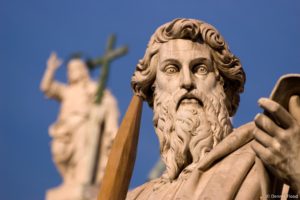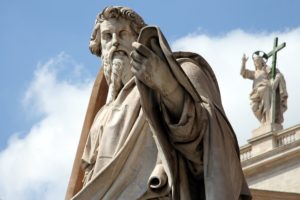
Every So Often in Church History Dispute Arises
Does Paul’s Gospel Differ from Jesus’ Gospel?
In our time there is another round of dispute comparing Paul’s Gospel with Jesus’ Gospel, and by implication the Apostle’s Gospel as they received their truth directly from Christ. Today’s dispute flies under the title of New Perspectives on Paul (NPP) which claims to bring new clarity to this discussion but actually engenders disputes (1Ti 6:20-21). First, what does the Bible teach? That should be the starting point for every godly discussion concerning the faith (Jude 18-21).
Jesus stated He was sent primarily to the lost sheep of the house of Israel (Mt 15:24-28). He came as Messiah to lead His people in taking the Gospel to the World (Jo 10:14-18). The gospel books are arranged depicting Jesus’ gospel moving from Jew to Gentile culminating in John, loved cousin of Jesus, which highlights that Jesus is God over all peoples and giving life to all who believe in Him (Jo 1:1-18). Though the Eleven were primarily taught He was Messiah, they were also given glimpses that the Gospel would go beyond the Jews; i.e., Christ’s statement that His Church would be built on Himself (Mt 16:15-18) and His final commission to them to go into the World with His Gospel (Mt 28:17-20; Jo 20:21-23). The Church was not a Jewish institution per se but an adaptation of the synagogue concept to prepare believers in the Word so they can go into the world with this same Gospel (Ep 4:1-14). The Eleven were faithful in laying this foundation after the Holy Spirit entered them on Pentecost, the beginning of the new covenant (Ac 2). The book of Acts describes the growth of Jesus’ Church; first among the Jews and then outward to the Gentiles. Paul is also introduced in Acts (Ac 7:58-8:3).
Saul was a Hebrew of the Hebrews, a Pharisee, taught by Gamaliel and a persecutor of the Apostle’s Gospel (Ac 22:3; Ph 3:4-6). Whereas the Eleven were relatively uneducated in the Scriptures, Saul was thoroughly grounded in the Old Testament. Saul {Desired} was his Hebrew name; however, it was not unusual for those living amongst the Gentiles to also have a Gentile name; his was Paul {Little} (Ac 13:9). Notice that this man went from desiring to please God, though in effect he was pleasing Jews and himself, to being small after Jesus saved him (2Co 12:7-10). This change began when Jesus revealed Himself to Saul leading to his salvation (Ac 9:1-19). While the Eleven chose Matthias to replace Judas Ish Kerioth, Jesus chose Saul just as He had chosen each of the Twelve (Ac 1:15-26). Just as the Eleven were told to go to the Jews and then into the World, Saul was told he was to go to the Gentiles and Jews (Ac 9:15-16). Thus, Paul’s mission was diametrically different from the Eleven in scope; in fact, it was Saul’s persecuting influence that forced the Gospel out of Jerusalem into Judea, Samaria and beyond.
Whereas the Eleven needed instruction in the Scriptures, Paul needed no such instruction; rather, he needed to understand how the Scriptures pertained to Christ just as Jesus had taught the disciples on the Emmaus Road (Lk 24:25-27). Thus, Paul did not go to the Eleven to learn the Gospel (Ga 1:15-20). Instead, he went into Arabia, of his day, to reconcile the Old Testament to this new covenant reality. He literally needed and received help from Christ in the form of a vision. Then he went to Jerusalem some three years later to talk with Peter and James, brother of Christ for two weeks. Was this to reconcile two different gospels? Let us read the Bible.
Acts discusses a controversy of the early Church, in those days there was only one church. Jews wanted the Gentiles to convert to Judaism to be able to receive Christ. Scripture does not give the views of the Eleven on this matter but Paul and Barnabas refused this position, especially during their first missionary journey. This caused such a problem that a church council was called in Jerusalem between the apostles and elders of Jerusalem and those of Antioch to include Paul and Barnabas (Ac 15:1-35). Bible clearly records there were no discussion of two different gospels; instead, the apostles and elders of Jerusalem agreed with Paul that Gentiles did not need to come under the Law to be saved as was already demonstrated through Peter earlier (Ac 10:1-11:18). Indeed, Paul and Barnabas were given the right hand of fellowship, approval that there was indeed only one gospel (Ga 2:1-10). Thus, Peter and others would take the Gospel to the Jews while Paul would take the Gospel to the Gentiles, though he often started with the Jews in each city. Paul was not in awe of the Eleven and criticized Peter for succumbing to the circumcision party in front of Antiochian gentiles even though he knew better (Ga 2:11-16).

Gospel Preached by Paul Always Based on
Jesus as the Sin Sacrifice on the Stauros
Jews did not understand they were chosen people to live differently and thus be the beacon of God’s light into the dark world. However, instead of understanding the Law as condemning them and the sacrifices pointing to the coming God-Man who would die to satisfy the Law’s demands over them; they instead sought to be their own justification by works. The circumcision party of Paul’s day sought to impose this on Gentile converts because they believed Gentiles were goyim, less than people as taught in their customs {Talmud}. This only continued the proselytizing of Pharisaical Judaism and built barriers already evident in the early Church requiring the installation of Deacons, those who serve, insuring all were treated the same in distributions (Ac 6:1-7).
Paul, though a religious Jew, was an outsider. He was not from Jerusalem. His roots were not in Judea. He was not part of the Eleven. He was very well versed in the Scriptures. This gave him a unique perspective to build the new covenant on the old covenant. He was able to see Christ in scriptures that were not clear to the Eleven, including Peter (2Pe 3:15-18). Yet, Peter declares that Paul teaches the same Gospel and warns people “not to be carried away with the error of lawless people and lost your own stability”. The perceived differences arise because the Eleven were preaching to Jews who did not need to be instructed in the Law and sacrificial system. They just needed to understand that Jesus was the Messiah and to believe in His name to be saved (Jo 1:12-13). However, majority of Gentiles would have no understanding of this perspective and it was not necessary either. The essence of the salvation gospel is that Jesus, anointed of God {Christ}, died in place of sinful people so they may eternal life (Ro 5:6-11).
Thus, there is only one gospel. All who are saved under the new covenant are in equal standing before God, justified not by self works but covered in the righteousness of Christ alone (2Co 5:21; Col 3:11). Yet, even in his day Paul’s apostleship was not always accepted; he constantly had to establish the authenticity of his gospel as coming from Jesus, author and finisher of all faith (He 12:1-2).
If the Bible is clear, why is this still an issue? As Peter says, “there will be false teachers among you who will secretly bring in destructive heresies”…”And many will follow their sensuality…” (2Pe 2:1-3; Jude). They claim to preach the truth of Christ but actually teach the lie of Lucifer to those foolish enough to follow such myths to their own destruction (2Th 2:9-12; 2Ti 3:1-5; 4:3-4). We are to engage in the study of the Scriptures showing ourselves approved workmen to God; thus, I usually avoid discussing these ever present controversies (2Ti 2:14-19). Let us follow Paul’s direction to depart from these issues and concentrate on learning to distinguish good from evil as mature believers in the Lord and His word (He 5:11-14).
